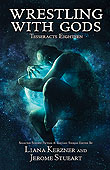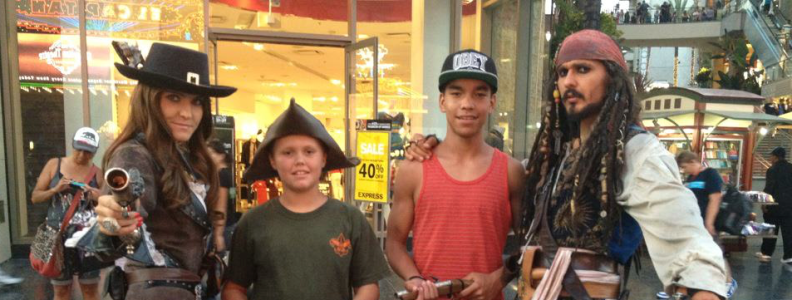 Liana K and Jerome Stueart are the editors of Tesseracts 18: Wrestling with Gods and the people I have to thank for selecting my story “Burnt Offerings” for publication in the anthology. I’ve written previously (link) about my contribution, but recently I had a chance to ask a few questions of the editors themselves. I asked about how editors select stories out of the slush, what an editor’s job is like and what it means to Wrestle with Gods in speculative fiction stories.
Liana K and Jerome Stueart are the editors of Tesseracts 18: Wrestling with Gods and the people I have to thank for selecting my story “Burnt Offerings” for publication in the anthology. I’ve written previously (link) about my contribution, but recently I had a chance to ask a few questions of the editors themselves. I asked about how editors select stories out of the slush, what an editor’s job is like and what it means to Wrestle with Gods in speculative fiction stories.
Of all the possible themes for an anthology, why did you pick religion, faith and speculative fiction? What do you think speculative fiction can tell us about faith (and perhaps vice versa)?
LK: The great thing about speculative fiction is that it can create distance between our reality and a fictional one. This allows us to examine things like religion without everyone involved freaking out.
What can it tell us about faith? I think the book shows it can tell us many things. Too numerous to list here!
JS: Personal beliefs make great strong characters, and cultural beliefs that may clash with personal beliefs–that’s good prime tension. Religions ask big questions too— is there more than this life? Are there others out in the universe? How did we get here? What’s our purpose? Science Fiction asks those same big questions–and their answers are often just as profound and interesting–but I think there’s a special intersection that religion and science fiction has where you can stand and look down both streets. Spec fiction lets us talk about faith in a very non-confrontational way, too–certainly a more interesting way. We don’t have to get caught up in the trappings of our own faiths and religions here to talk about “belief” and about “faith”. We don’t have to say Rabbi or cross or bodhisattva–or Judaism, Christianity and Buddhism–but we can use a parable, of sorts, to talk about the ideas behind faith. Sneak behind our biases and prejudices. The alternate world allows us to examine faith in a way that doesn’t feel like we’re breaking any vows or betraying any of our gods.
Many of our readers at The Fictorians are hopeful authors or new authors. Could you tell us about your process for choosing which stories you want to select for an anthology such as Wrestling with Gods? I’m sure those readers would appreciate some advice as they edit their work for submission. What makes a story “stand out” to you?
LK: For this anthology, there had to be something about it that felt alive to me. We were really lucky in that there was a lot of overlap in what Jerome and I thought had that indescribable quality. Many authors haven’t found their unique voice yet, so they copy styles and concepts. That’s great for a spec script, but not for something like this.
In the case of this book, we were also looking for an insider perspective, not some outsiders saying “what a strange people”.
Some stories didn’t get selected just because they didn’t follow the guidelines. Simple things like word count, or the submission deadline. If you’re a hundred words over, no biggie. If you submit something that’s double the word count, that’s really pushing your luck.
JS: When I pick up a good story, I am with a great character doing something interesting immediately, absorbed in his or her world, seeing specific things that lead me to a dilemma quickly–usually within the first paragraph, certainly within the first page. Confident, vivid language and a unique character I can know and empathize with quickly are also telltale signs that I can sit back comfortably and go where the author wants me to go. On the other hand, characters that are not actors in their worlds, who make me have to follow long monologues in their heads, who give me nothing to see, who talk vaguely about their lives, or who drive endlessly while they think—these are stories that I can lay aside. That’s just me. But every one of the stories in Wrestling With Gods fought for their space and earned it with me.
I’ve had readers tell me that they were pleasantly surprised to discover that Wrestling with Gods wasn’t biased for or against religion, or favouring any one faith in particular. The previous question was about how to make an individual story stronger, so for this question, can you tell our readers more about how you “craft” an anthology–the skill set of being an editor and selecting the right stories from the slush? It’s something I’ve not yet done. What do you do to make an anthology the strongest it can possibly be?
LK: Well again, we had it easy in that there are so many religions that deserved representation. And the poetry was so strong!
Once we had our choices, I tried to divide the book into acts, using those poems as breaths. Long stories were separated by shorter ones for pace as well.
We started with the Christian stories because they’d be the most familiar faith to most people. And Mecha-Jesus is just so fun that we thought it was a good introduction, especially since it contained Shintoism as well. Rob Sawyer’s story then provided a balance, because it’s so haunting at the end.
That was our basic step. That pattern replicates throughout the book. I tried to arrange the stories so that there’s a journey for the reader with a crossover to something greater as the final act.
JS: Pick good stories first. I think we both made a pact to do that. I don’t think about “anthology” or “balance” or ANYTHING at the beginning. I’m in the greatest store on earth and I get to pick up anything I like–and so I choose what I enjoy and what I love first. (I’ll mark a maybe, or a “come-back-to-it-later”, but sometimes you go with the stories that grab you.) So, first Pick What You Love. If I fill an anthology with stories I feel passionate about, then I can defend my choices. I don’t add in a story for a fictionalized reader in my head who might like paranormal romances…. if I don’t like the story, I don’t feel like I can put it in.
Once you get the sixty or so short stories that are rockin’ this world, then you have to make some tough choices and, if you are working with a brilliant co-editor who is on your wave-length (and I was lucky, very lucky), she will validate your passions and will also help you discern the ones that are good stories but that may not be AS good as others.
Then when you get the 25-30 selections, you balance them in a readable pattern. I think Liana did a great job of creating for the anthology a reading experience where stories may have opposite effects on you, but have some link next to each other. Each story and poem was linked to the ones beside them so it would seem, perhaps, that you were deep in a conversation about faith (or about heavy metal tattoo artists, or about space exploration…)
Is there anything else you’d like to tell our readers, either about writing in general or Wrestling with Gods in particular?
LK: Just because a story isn’t good for a particular book doesn’t mean it’s not good. Write to write. If you’re willing to constantly hone your craft, your time will come.
About Wrestling With Gods, obviously I want people to read the book!
JS: Don’t be shy about dealing with faith or religion in science fiction or fantasy. I think it leads to some greater character depth. You design characters with inner tension, right? Well, there’s no tension like cultural or societal tension rooted in a belief system that the character has either bought into and believes, or has felt abandoned by, or has abandoned. His/her worldview can emerge from this lost/deeply held belief system—and it is never, never, never a clunky cut-and-paste stereotype of “faith”. Faith is the amalgam of our experiences and our beliefs together–and we trim our memories of experiences to match our beliefs (Uncle John would never have done that–so I’m not going to think he did) or trim our faiths to match our experiences (Uncle John sold his son to the Traders. I thought our family had morals.) Every person is unique; every belief emphasizes a bit more of this and a bit less of this because that worked for me and this didn’t. So cool characters can emerge from turning points and disappointments and miracles in their spiritual journey that is lockstep with their physical journey. We craft our faiths, just as we are crafted by them.




